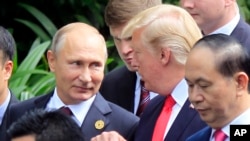European leaders have agreed to extend their sanctions against Russia for its 2014 annexation of Ukraine's Crimean peninsula. The EU leaders said in statement Friday the sanctions have been extended for six months.
The decision was made at the leaders' summit in Brussels after they had a "very short discussion" on Ukraine, an anonymous source told AFP, the French news agency.
The United States, meanwhile, is also holding to sanctions against Russia for its 2014 annexation of Ukraine's Crimean peninsula.
The U.S. intelligence community also concluded that Russia interfered in the 2016 U.S. presidential election to help Trump win the White House and special counsel Robert Mueller has already indicted Russian individuals and entities in a scheme to influence the vote.
Meanwhile, as the date and venue for President Donald Trump's summit with Russian President Vladimir Putin were announced, the U.S. leader continued to dismiss allegations that Moscow interfered with his 2016 election.
Trump has long disparaged the investigation of special counsel Robert Mueller into Trump campaign links with Russia as a "witch hunt," but suggested in a new Twitter comment that he accepts Russian denials that it interfered.
"Russia continues to say they had nothing to do with Meddling in our Election!" Trump declared.
Trump's view contrasted with a Wednesday comment by Secretary of State Mike Pompeo, saying that when Trump and Putin meet, Trump is sure to warn the Russian leader that it is "completely unacceptable" to interfere in U.S. elections.
The July 16 talks between the two leaders in Helsinki will be their first full-fledged meeting after previous shorter encounters at international gatherings. They are occurring at a difficult time in Washington-Moscow relations.
But as the summit was announced, Trump railed against Mueller and his 13-month probe in a string of tweets, saying in one of them, "There was no collusion and there was no obstruction of the no collusion."
The White House said Trump and Putin will discuss "a range of national security issues." The Kremlin said the two leaders will talk about "the current state and prospects for development of Russian-U.S. relations."
The Trump-Putin summit will come after the U.S. leader's attendance at the July 11-12 NATO summit in Brussels and July 13 meetings with British Prime Minister Theresa May and Queen Elizabeth in London.
Despite the sanctions against Russia, Trump has, even in the face of opposition from Western allies, shown an inclination to foster better with relations with Putin. He suggested earlier this month that Russia should be readmitted to the G-7 conclave of leaders of some of the biggest world economies after Moscow was suspended from the group when it annexed Crimea.
Trump said Wednesday that "getting along with Russia and with China and with everybody is a very good thing." Trump said he and Putin would discuss Syria, Ukraine and "many other subjects."
As relations between the two countries have chilled, they have traded cuts in their diplomatic entourages.
Before he left office and Trump assumed power, former U.S. President Barack Obama ordered the expulsion of 35 Russian diplomats and shut down two Russian recreational retreats in the U.S. in response to the election meddling. In a tit-for-tat action in mid-2017, Russia ordered the U.S. to cut 755 members of its embassy and consulate staffs in Russia.
Three months ago, the U.S. expelled 60 Russian officials from the U.S. and ordered the closure of the Russian consulate in the western city of Seattle in response to the Russian poisoning of former Moscow spy Sergei Skripal and his daughter Yulia in the British city of Salisbury.






